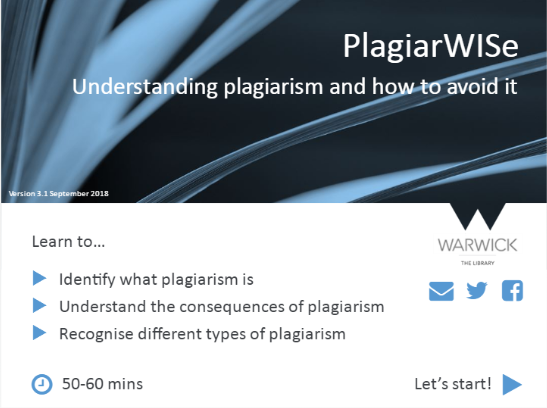Plagiarism. Passing someone else’s work off as your own. It’s forbidden by the University Regulations but do you know what is and isn’t plagiarism, and how to avoid it? Understanding this is the first step on the road to success at the university level, and here’s how the Library’s PlagiarWISe tutorial can help…
Why should I care about plagiarism?
Did you hear about the education and defence ministers in Germany who resigned over plagiarism? Plagiarism can ruin a career, so getting in good practice now can help you avoid plagiarism later in your working life. Have you heard any other cases of plagiarism in the news? What about Pharrell Williams and Robin Thicke being ordered to pay Marvin Gaye’s family over the song Blurred Lines? Another case from 2008 was a TV psychiatrist suspended from practice.
At university, plagiarism is a serious offence with harsh penalties. If you plagiarise you could find yourself failing the assignment or, in very serious cases, even being removed from your course. Understanding what it is and how to avoid it will help to ensure you don’t get caught out by accidentally plagiarising.
Also, think about what’s fair – how would you feel if another student had submitted plagiarised work and received a better mark than you?
Ok, you convinced me. How can PlagiarWISe help me avoid plagiarism?
The Library’s PlagiarWISe tutorial on Moodle is the university’s preferred tool and will help you understand plagiarism and how to avoid it. Learn to identify what plagiarism is, understand the consequences and recognise the different types of plagiarism so that you can avoid it in your assignments and projects.
What if I feel I don’t have the time to look at PlagiarWISe?
Setting aside a bit of time to look at this now can be worth it in the long run! You can test your understanding with scenarios and an interactive quiz, and you don’t have to do it all in one go.
Alright. What about referencing? What do I reference and how do I do it, to avoid plagiarism?
Referencing shows which ideas and words in your assignment are not your own, but have come from material you have read or consulted. Not sure if you need to reference something or not? The PlagiarWISe tutorial has examples to help you understand when you do and don’t need to reference (e.g. if something is a fact in common knowledge), but remember – if in doubt it’s always best to reference.
The Library’s RefWISe tutorials and referencing webpages can help you make sure you reference different sources correctly.
For more top tips on avoiding plagiarism, check out this study blog post.
How can my department help me?
If there’s one key message from this blog post – here it is: Check the University regulations and check with your department if there’s anything you’re not sure about. Don’t find yourself unintentionally plagiarising, be PlagiarWISe instead!
